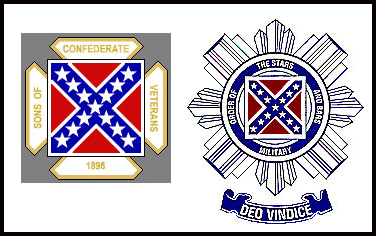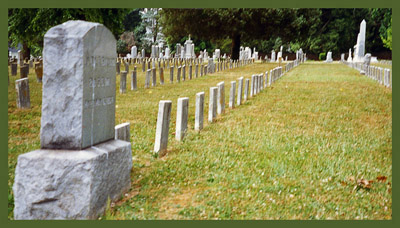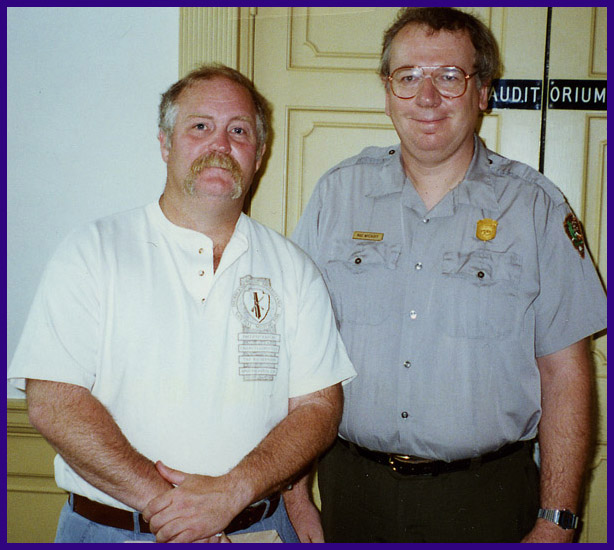
|

|
'Killed in battle of The Wilderness, May 6, 1864, in the 26th year of his age, Oliver J. Youmans, company C 2d S.C. Volunteers.'

|
Another Confederate soldier listed in the obituaries and death lists, one of many throughout a land giving the prime of his manhood in the cause of Southern Independence and States Rights. Only Oliver is a bit different, we know something of his story that makes his death a touch more fascinating and perhaps a little less sorrowful. As you read further you will find that Oliver Johnston Youmans was a South Carolinian, “truthful, conscientious and pure; a high toned gentleman, a gallant soldier, devoted patriot and a consistent Christian”. Oliver J. Youmans was born December 31, 1838, at Mexico Plantation in St. Peter’s Parish. Mexico was the estate of his grandfather Captain Nathan Johnston, this estate too later becoming a casualty of The War Between the States. The son of William Youmans Jr., and Salina Maria Johnston, she was known to be “a gentle, devoted mother”. Oliver was born into an affluent family settled in the antebellum planter class of South Carolina society. William Youmans owned at least two plantations, one of which is indicated to have ninety-eight slaves in 1860. William was also the Clerk of court and Sheriff of Beaufort District. In those days this was an important position, not exactly what we think of today as a sheriff’s duties, but more encompassing overall. Six of the seven sons born to William and Salina grew up to serve the Confederacy, the seventh being too young to be involved in the conflict. Of these, two never returned to the comforts of home. Oliver and brother Edwin Caruthers Youmans (Private, Company F, 3rd South Carolina Cavalry), who died January 15, 1864, a prisoner of war at the United States Post Hospital on Morris Island. The four remaining brothers survived the war, two surrendering at Appomattox and two serving in the 3rd South Carolina Cavalry disputing Sherman’s invasion of their homeland until the bitter end. Not a great deal is known about Oliver’s childhood but it is certain he enjoyed all the advantages and discipline that a youngster of his class would have been presented. He became a member of the Cooswhatchie Baptist church in 1854, and entered the South Carolina Military Academy (later becoming The Citadel) to continue his education. He appears to have done well, his academic placement 7th out of 15 students and was honored as the 4th of July Orator and valedictory Orator of his society, graduating in April, 1859. Oliver prepared himself reading law, as did several of his family members and was admitted to the Bar in November, 1860. With the country and his state anticipating the possible commencement of hostilities, Oliver entered into the service of South Carolina. Enlisting as a Corporal in Captain William Wallace’s Company, South Carolina Volunteers, the “Columbia Grays”, Oliver began his service at Morris Island, SC on April 24, 1861. This unit later became Company C of the 2nd South Carolina Infantry, mustering into the Confederate States service on May 22, 1861. For the brief time the Regiment served in its home state it was known as the Second Palmetto Regiment and was often called by this nickname as well as by the names of its officers as was common in the Confederate service. |
The bombardment of Fort Sumter on April 12, 1861 began the conflict in earnest. The 2nd (Palmetto) Regiment was present in Charleston at the time of the Yankee garrison’s capitulation. Shortly after the surrender, four companies of the Regiment agreed to be transferred to Virginia pending muster into Confederate service and Company C was ordered to Camp Davis near Richmond. Combined with six other Companies, the Regiment’s ranks filled to strength and as the 2nd SC Volunteer Infantry they trained and prepared for the impending struggle.
|
The Regiment was well blooded at First Manassas in July and played a part in this important victory. The conflict took on the grim frock of things to come; the men began to realize that war and battle have a high price in death and suffering. The months after Manassas did not bring any major engagements as both sides licked their wounds, regrouped, and wondered about the future. Many soldiers on both sides had viewed the war as a lark, anxious to enter the fray before the war could conclude without their participation, now they began to see the realities of the situation. The South Carolinian troops knew that their home state was under attack by the Federal Navy and troops from the sea. This fact discouraged many as well as the outbreak of illness in the camps that reduced their numbers and incapacitated friends and family members. Oliver was promoted to Sergeant by the end of October 1861. While the regiment went into winter quarters he developed a case of pneumonia and a brother came to Virginia to accompany him home to Gillisonville, South Carolina, where he would convalesce Returning in the spring of 1862, Oliver was reported “present for duty” in the March and April Muster rolls as a Fourth Sergeant. He found that several members of the company had departed the ranks for other units upon re-enlisting for a period of two years. Under act of the Confederate Congress, those who did re-enlist were granted furloughs, bounties and choice of unit should they wish to change. In March of 1862, General Johnston moved the army in anticipation of movements by the forces of Union General McClellan. Receiving orders to reinforce John B. Magruder near Yorktown, VA, the 2nd SC Infantry moved with the army and served at Yorktown through the evacuation in early May. With Johnston’s wounding at Seven Pines, Robert E. Lee took command of the Confederate forces on May 31, 1862. the “King of Spades” had the army constructing fortifications around Richmond and prepared to defend the Capitol. |

|

|
The battle of Fredericksburg, various skirmishes, and the Chancellorsville Campaign saw Oliver promoted as his experience and battle casualties continued to mount.
Elevated to First Sergeant by the November/December, 1862 Muster Roll, finally becoming a 2nd Lieutenant, “Promoted for Distinguished Valor and Skill”, May 2, 1863,
Captain Wallace, in a letter to General Samuel Cooper, dated April 25, 1863, states, “I respectfully recommend that 1st Sergeant Oliver J. Youmans of said Company
be appointed to that office (2nd Lt.) under act of Congress which provides for the appointment or promotion of officers for gallant or meritorious conduct.
Sergeant Youmans exhibited extra-ordinary valor at the battle of Malvern Hill, a detailed account of which will be substantiated as required, and is a
gentleman of remarkable purity of character. He graduated with distinction at the State Military Academy of South Carolina and is well qualified to
discharge the duties of the office for which he is recommended.” Oliver became hardened and confident wit the campaigns of the army, his patriotic zeal
and ambition becoming more and more realized.
With the promotion of William Wallace to Major in June of 1863, Oliver became acting Captain of Company C. So it was as acting Captain that he moved with the army to commence Lee’s second invasion of the North. Gettysburg was hard on the army and the 2nd SC Infantry. The regiment suffered over 40% casualties during the campaign and were heavily engaged the second day, July 2, 1863. They watched and listened to the debacle of Pickett’s Charge but took no part in the third day’s battles. Oliver, the Regiment, and the army, had much to think about as they traveled the weary road south. |
Kershaw’s Brigade to which the 2nd SC Infantry was attached was ordered to the west with Longstreet’s Corps. Oliver was with Longstreet’s troops that crashed through the gap in the Union li8nes at Chickamauga; he survived the Knoxville Campaign and Siege and the East Tennessee operations.
It was in February of 1864, while in Tennessee, that Oliver was faced with a difficult situation that required all the moral courage he could muster. With the three year enlistments of most of the Company expiring in the spring and his promotion to Captain imminent, many made it clear that they would not re-enlist in Company C if Oliver continued in command. Was it his ambition that caused his men to react in that fashion? In the words of Mac Wyckoff, Park Historian in Fredericksburg, VA, “Military trained officers like Youmans were often strict disciplinarians. Probably for this reason, he had gotten on the wrong side of his men. Knowing that the Confederates needed every man to contest General Grant’s anticipated spring offensive, he tendered his resignation rather that accept the promotion to Captain.”
Oliver wrote the following letter of resignation to James Seddon, Secretary of War, from Rupperville, Tennessee on February 8, 1984:
“ Sir, I find the expectation that I am to command the Company to which I belong, is an impediment to the reenlistment of nearly one half of the members present. As I do not wish to prevent an act which I believe to be alike honorable and beneficial to the service, I beg leave to resign my commission as First Lieutenant. Under the circumstances, I am unwilling longer to command the company if it be permitted me to resign. This resignation is unconditional, but I would request permission to join some other organization. I pledge myself if this privilege is accorded me to reenter the service immediately. I am happy to say that I leave an officer in command of the Company fully capable of performing the duties which in that case would devolve upon him.
Respectfully submitted, Oliver J. Youmans 1st Lt., Co. C, 2nd SCV.” Oliver’s resignation from command was accepted although it was not unanimous based upon the signature sheet from his file. Quoting again from Mac Wyckoff, “His resignation was accepted on March 16, 1864 and he re-enlisted as a private in the same Company. For a South Carolinian of his social and economic class to have swallowed his considerable pride and to have sought h\this demotion had to require an immense amount of moral courage and sense of patriotic duty.”
|
Longstreet’s troops returned to Virginia, and with the Spring 1864 campaigns commencing, Oliver took his place in the ranks.
It was during the battle of The Wilderness on the second day, May 6, 1864, that Oliver Johnston Youmans was killed in combat.
He was dutifully performing the service of a private in the Army of Northern Virginia. At last his ambition and dedicated efforts
to South Carolina and the Confederacy, were at an end. He was buried, “amid strange faces from strange lands, (he)
rest in the rude burial of the soil now in the hands of the hated foe.”
After the war, Oliver’s remains were reinterred at the Fredericksburg Confederate Cemetery in Virginia. Oliver is now under the care of the Ladies’ Memorial Association of that lovely City, and it is with many thanks that we recognize their efforts. He is buried along a row with other men from his state, his simple headstone indicates only “Yowmans”, his name misspelled. It is probable that his family never was aware of his burial location. They had the means to have his remains returned to Beaufort District and more than likely would have done so had they been advised of where his body rested. |

|

|
William Youmans made inquiries to the Confederate government and eventually received $250.83, due from Oliver’s service.
The family mourned his death and continued to adjust to the trials and tribulations the war had brought to their doorstep.
Little did this family know how much worse things were soon to be. Before the end of the struggle South Carolina was
to be made prostrate by the invading forces of William T. Sherman.
While visiting The Citadel Chapel, I proudly viewed and photographed the name of Oliver J. Youmans as listed upon the plaque of graduates lost to our wars. Since before the War Between the States to modern Iraq, Citadel graduates have gone forth to defend our Country and the rights of freedom, wherever the conflict may be. On February 2, 1865 a skirmish took place in Oliver’s home area of Lawtonville, South Carolina with some unknown Confederates, probably militia and units of the Union 20th Army Corps commanded by General Alpheus S. Williams. Six Yankees were killed and afterwards, the Federals burned the place to the ground. All that is left of the town of Lawtonville is the Lawtonville Cemetery and this is what the locals refer to when the town is mentioned. This cemetery contains an obelisk marker dedicated to the seven sons of William Youmans Jr., and Salina Maria Johnston. It isn’t much really, but they are remembered. |

|